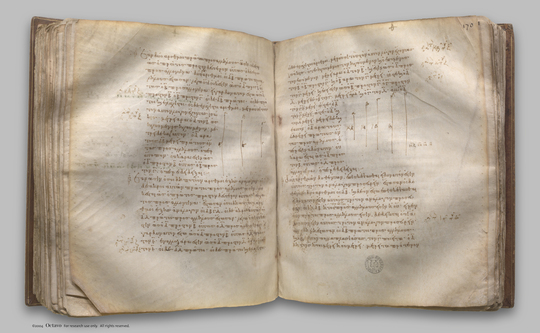index prev next | digilib folio 174

If two numbers be prime to one another, the second will not be to any other number as the first is to the second.
| Ἐὰν δύο ἀριθμοὶ πρῶτοι πρὸς ἀλλήλους ὦσιν, οὐκ ἔσται ὡς ὁ πρῶτος πρὸς τὸν δεύτερον, οὕτως ὁ δεύτερος πρὸς ἄλλον τινά. Δύο γὰρ ἀριθμοὶ οἱ Α, Β πρῶτοι πρὸς ἀλλήλους ἔστωσαν: λέγω, ὅτι οὐκ ἔστιν ὡς ὁ Α πρὸς τὸν Β, οὕτως ὁ Β πρὸς ἄλλον τινά. Εἰ γὰρ δυνατόν, ἔστω ὡς ὁ Α πρὸς τὸν Β, ὁ Β πρὸς τὸν Γ. οἱ δὲ Α, Β πρῶτοι, οἱ δὲ πρῶτοι καὶ ἐλάχιστοι, οἱ δὲ ἐλάχιστοι ἀριθμοὶ μετροῦσι τοὺς τὸν αὐτὸν λόγον ἔχοντας ἰσάκις ὅ τε ἡγούμενος τὸν ἡγούμενον καὶ ὁ ἑπόμενος τὸν ἑπόμενον: μετρεῖ ἄρα ὁ Α τὸν Β ὡς ἡγούμενος ἡγούμενον. μετρεῖ δὲ καὶ ἑαυτόν: ὁ Α ἄρα τοὺς Α, Β μετρεῖ πρώτους ὄντας πρὸς ἀλλήλους: ὅπερ ἄτοπον. οὐκ ἄρα ἔσται ὡς ὁ Α πρὸς τὸν Β, οὕτως ὁ Β πρὸς τὸν Γ: ὅπερ ἔδει δεῖξαι. | If two numbers be prime to one another, the second will not be to any other number as the first is to the second. For let the two numbers A, B be prime to one another; I say that B is not to any other number as A is to B. For, if possible, as A is to B, so let B be to C. Now A, B are prime, primes are also least, [VII. 21] and the least numbers measure those which have the same ratio the same number of times, the antecedent the antecedent and the consequent the consequent; [VII. 20] therefore A measures B as antecedent antecedent. But it also measures itself; therefore A measures A, B which are prime to one another: which is absurd. |